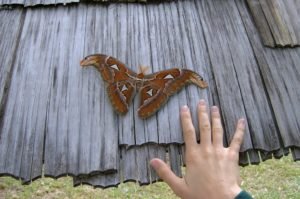 |
| Fresh water in Transylvania / J.Thomson |
In my view there are compelling reasons to increase the amount and quality of outdoor education in schools. We have an unprecedented environmental crisis that is accelerating the decline of ecosystems worldwide on the one hand, and a crisis of mental health, disconnection and loss of hope in many young people on the other. The Covid-19 Virus and its social, economic and political consequences is making our interdependence clear on so many levels, and challenging us to adapt in new ways to limit the spread of the pandemic whilst also maintaining positive relationships and attitudes.
 |
| Atlas Moth in Thailand / J.Thomson |
It has been demonstrated that nature connectedness improves mental health and wellbeing and also increases the likelihood that the individual will make positive interventions that conserve nature. In other words, it benefits both the natural world and human wellbeing. Nature connectedness doesn’t just mean being surrounded by greenery, exercising in nature or going for holidays in beauty spots. It is an active engagement with nature through attention of the senses, connecting emotionally, seeing beauty and harmony, finding meaning in the natural world, and feeling compassion for all living things. (check out this article for more in-depth on the subject)
I am in the Yilan Province of Taiwan, working with CiXin Waldorf School in Dongshan to enhance their outdoor education curriculum right through from Years 1 to 13, but focusing on the high school. The goal is to use outdoor education to let the students grow in their self confidence, their physical and mental resilience, their agility to learn new things, their understanding of their place in the world and their nature connection. In this way we can hope that the students will move on into their lives with a sense of meaning, purpose and empowerment to participate in the world with confidence, offering unique strengths and value.
My time with the school involves working with the teachers and administrators to develop a heightened vision for the outdoor programme, review the present offerings and explore opportunities to enhance or add to the various outdoor activities that are already in place.
As part of this process I have been invited by the teachers to explore the region of the NE of Taiwan to help find opportunities for creating new outdoor learning experiences for the various classes.
This video gives an idea of the forests that are not far from the school. We visited them one day to assess their potential for outdoor activities:



Not sure how the Ashburton Museum and Historical Society logo go there but I guess because I use wordPress to manage and write the Society website it pops up somehow. For my sins I am the president but I also try to include biographies of geologists to help explain how we got where we are in our geological conceptua journeys.
Cheers
Glenn